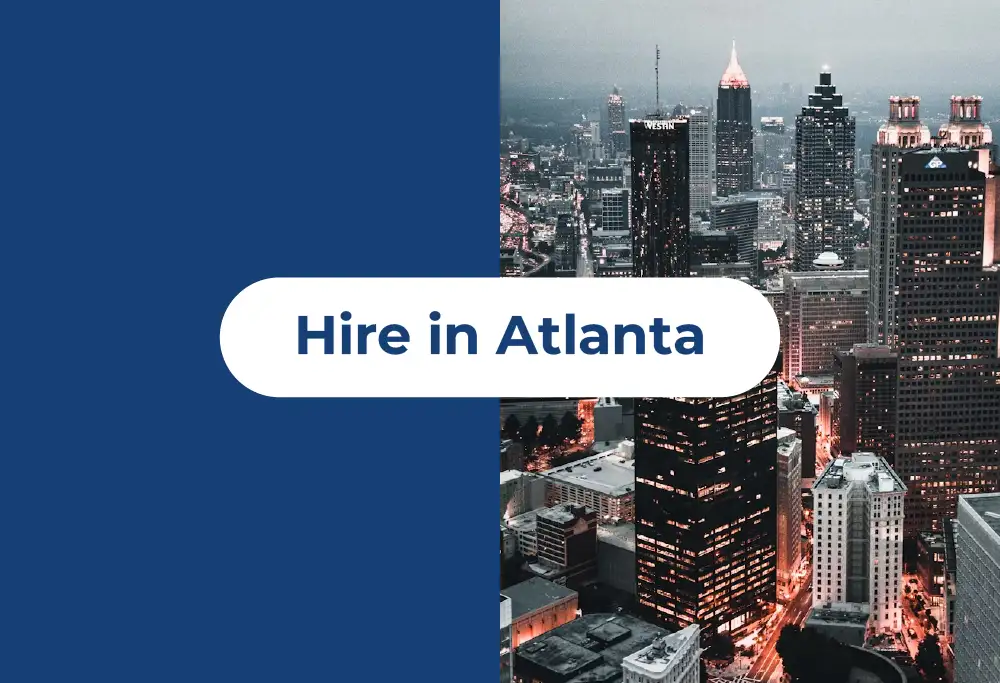Atlanta, the capital of Georgia, is one of the fastest-growing metropolitan areas in the United States and a vital hub for commerce, logistics, and innovation.
Known as the “Gateway to the South,” Atlanta has transformed into a global city with influence across finance, technology, film, and transportation.
Home to the busiest airport in the world, a vibrant university ecosystem, and a diverse workforce, Atlanta is an increasingly attractive destination for businesses seeking to hire in 2025.
With its lower costs compared to many U.S. metropolitan hubs and its strong economic diversity, Atlanta provides companies with the resources they need to expand and attract talent.
This guide explores everything employers must know about hiring in Atlanta, from legal requirements and compliance to recruitment strategies and competitive benefits.
How to Hire in Atlanta Easily in 2025
Employers expanding into Atlanta can hire in two primary ways:
- Establishing a U.S. entity in Georgia, which allows full control over hiring but requires incorporation, tax registration, and ongoing compliance with both federal and state laws.
- Partnering with an Employer of Record (EOR), which provides a faster entry into the Atlanta labor market. The EOR manages payroll, benefits, contracts, and compliance while the employer directs the employee’s daily activities.
The general hiring process in Atlanta involves:
- Registering for employer taxes at both federal and state levels.
- Following U.S. and Georgia-specific labor laws.
- Drafting clear job descriptions aligned with industry standards.
- Offering benefits packages competitive in Atlanta’s market.
- Leveraging the city’s universities, job boards, and professional networks to attract talent.
Why Hire in Atlanta? The Benefits of Hiring in Atlanta
Strategic Location
Atlanta is a key transportation hub, home to Hartsfield-Jackson Atlanta International Airport, the busiest airport in the world, providing unmatched access to domestic and international markets.
The city’s strong road and rail infrastructure also makes it one of the most important logistics hubs in the U.S. For companies in transportation, supply chain management, and global commerce, Atlanta offers unparalleled connectivity.
Strong Talent Pipeline
Atlanta boasts a highly educated and diverse workforce. Institutions such as Georgia Tech, Emory University, and Georgia State University produce graduates in engineering, technology, business, and healthcare. This ensures a steady supply of skilled talent across multiple industries.
Diverse Economy
Atlanta’s economy spans multiple sectors, including film and entertainment, financial services, healthcare, technology, aerospace, and logistics. The presence of Fortune 500 companies like Coca-Cola, Delta Air Lines, and Home Depot demonstrates the city’s business strength. This diversity provides opportunities for employers across industries.
Affordable Cost of Living and Business Operations
Compared to cities like New York, San Francisco, or Washington, D.C., Atlanta offers significantly lower living costs and operational expenses. Housing, office rents, and daily costs are more affordable, allowing companies to provide competitive compensation packages while keeping overhead manageable.
Legal Requirements for Hiring Employees in Atlanta
Employers hiring in Atlanta must comply with both federal labor laws and Georgia state regulations.
Employment Contracts
Georgia, like most U.S. states, follows the “at-will” employment principle, which allows either the employer or employee to terminate the relationship at any time without cause, provided it doesn’t violate discrimination or labor laws. Written employment contracts are not required but are strongly recommended for clarity around compensation, benefits, and job expectations.
Working Hours and Overtime
The standard workweek in Atlanta is 40 hours. Under the Fair Labor Standards Act (FLSA), non-exempt employees must be paid 1.5 times their hourly rate for hours worked beyond 40 in a week. Employers must also adhere to federal and state rules regarding rest and meal breaks.
Probation Periods
Probationary periods are not legally required in Georgia but are commonly used by employers in Atlanta. Most probationary periods last 90 days, allowing both employer and employee to evaluate suitability.
Termination of Employment
Georgia is an at-will employment state, meaning employers can terminate employees without cause, provided the dismissal is not discriminatory or retaliatory. Severance pay is not legally required but may be offered voluntarily or outlined in employment contracts. Employers are advised to document performance and disciplinary issues carefully to reduce legal risks.
Taxation and Social Security Contributions in Atlanta
Employers in Atlanta must comply with federal tax obligations and Georgia-specific requirements.
1. Individual Income Tax (IIT)
Georgia levies a progressive state income tax, with rates ranging from 1% to 5.75%. Employees must also pay federal income tax, which ranges from 10% to 37% depending on earnings. Employers are responsible for withholding both state and federal income taxes from employee wages.
2. Employer Contributions to Social Insurance
Employers in Atlanta must contribute to several mandatory programs:
- Social Security: 6.2% of wages (matched by employees).
- Medicare: 1.45% of wages (matched by employees).
- Federal Unemployment Tax (FUTA): 0.6% of the first $7,000 of wages after credits.
- Georgia State Unemployment Insurance (SUI): Employers must contribute at rates determined by their industry and claims experience.
3. Contribution Bases
Social Security contributions are capped at the annual federal wage base (projected at $168,600 in 2025). Medicare contributions have no cap, but employees earning over $200,000 annually are subject to an additional 0.9% surtax.
Work Permits and Other Requirements for Hiring Foreign Workers in Atlanta
As an international business hub, Atlanta attracts a large number of foreign professionals, particularly in aviation, technology, and finance. Employers hiring non-U.S. citizens must follow immigration and labor requirements.
- Visa Sponsorship: Employers commonly sponsor H-1B visas (specialty occupations), L-1 visas (intra-company transfers), and O-1 visas (extraordinary ability). Employers must demonstrate that local candidates cannot easily fill the role.
- Labor Condition Application (LCA): Required for certain visas to ensure compliance with fair wages and workplace standards.
- E-Verify: Many employers in Georgia use the federal E-Verify system to confirm employment eligibility of new hires.
- Health and Background Checks: Certain visa categories require criminal background checks and medical clearances.
Current Trends and Top Recruitment Strategies in Atlanta
Atlanta’s labor market is evolving rapidly, with demand growing in technology, film, and logistics. Effective recruitment strategies include:
- University Collaborations: Employers work closely with Georgia Tech, Emory, and Georgia State to recruit top graduates in engineering, business, and healthcare.
- Targeting Film and Entertainment Talent: Atlanta has become a major center for film production, creating opportunities in media, production, and creative industries.
- Technology and Cybersecurity: With Atlanta’s rising profile in tech, companies should emphasize innovation and professional growth to attract IT and cybersecurity professionals.
- Diversity and Inclusion: Atlanta has one of the most diverse workforces in the U.S. Employers who promote inclusivity and community engagement are more attractive to candidates.
- Flexible Work Models: Many employees expect hybrid or remote work opportunities. Companies that provide flexibility gain a recruitment edge.
Hiring Skilled Workers vs. Entry-Level Talent in Atlanta
Hiring Skilled Workers
Experienced professionals in Atlanta, particularly in finance, healthcare, and technology, expect competitive compensation packages, comprehensive benefits, and clear career paths. Employers must emphasize leadership opportunities, training, and innovation to attract top talent.
Hiring Entry-Level Talent
Atlanta’s universities provide a large and steady flow of graduates entering the workforce each year. To attract entry-level talent, companies should focus on offering mentorship, internships, structured training programs, and professional development opportunities. These initiatives also increase retention.
Competitive Benefits in Atlanta
In Atlanta’s competitive hiring market, benefits are a crucial differentiator. Common offerings include:
- Health, dental, and vision insurance
- 401(k) retirement savings plans with employer contributions
- Paid time off and parental leave
- Tuition reimbursement and professional training opportunities
- Wellness programs, including gym memberships and mental health support
- Flexible or hybrid work arrangements
Hiring Solutions for Foreign Companies in Atlanta
International companies seeking to hire in Atlanta can choose from three primary hiring models:
Independent Contractors: Provide flexibility and cost efficiency but require careful classification under IRS and Georgia laws to avoid misclassification penalties.
Establishing a U.S. Entity: Allows full control but requires significant investment and compliance with state incorporation and tax regulations.
Employer of Record (EOR): The fastest and safest solution for foreign companies. An EOR manages payroll, compliance, and HR functions on behalf of the company, while the employer directs the employee’s work. This allows quick entry into Atlanta’s labor market without setting up a local entity.
Trust INS Global to Hire in Atlanta Today
Atlanta offers one of the most dynamic hiring environments in the United States in 2025. With its strong talent pool, diverse economy, strategic location, and affordable costs, the city provides opportunities for companies across multiple industries.
However, navigating Georgia’s employment laws, tax obligations, and visa sponsorships can be complex. That’s where INS Global can help.
Our Employer of Record (EOR) services simplify the hiring process in Atlanta, ensuring full compliance while allowing companies to focus on growth and strategy.



SHARE